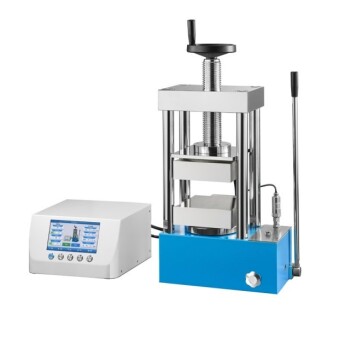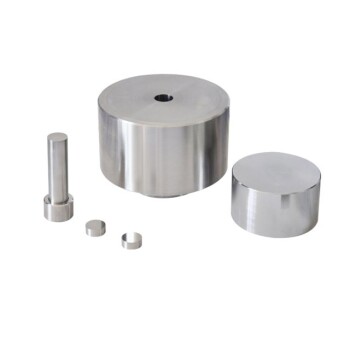In the laboratory, precision in a hydraulic press is the critical factor that ensures your results are repeatable, reliable, and scientifically valid. Without precise control over the applied force, you introduce an uncontrolled variable that undermines the consistency required for serious research and quality control.
A hydraulic press is more than a tool for applying force; it is an instrument for creating controlled conditions. Its precision is the foundation of experimental reproducibility, guaranteeing that variations in your results stem from your sample, not your equipment.

The Core Function of a Lab Hydraulic Press
A hydraulic press is a staple in many labs, primarily used to prepare samples for analysis or to test the physical properties of materials. Its value lies in its ability to generate and apply a specific, controlled force to a small area.
Sample Preparation for Analysis
Many analytical techniques, such as FTIR (Fourier Transform Infrared Spectroscopy) and XRF (X-Ray Fluorescence), require samples to be prepared in a uniform, dense pellet. A hydraulic press is used to compact powdered material, like a sample mixed with Potassium Bromide (KBr), into a solid disc.
Material Properties Testing
In materials science and engineering, a press is used to determine a material's response to compressive force. This helps researchers understand properties like compressive strength, durability, and deformation characteristics.
How Precision Directly Impacts Research Outcomes
Precision isn't a luxury feature; it's a fundamental requirement. Inconsistent force application directly leads to inconsistent results, invalidating comparisons between samples.
Ensuring Repeatability and Reproducibility
The cornerstone of the scientific method is repeatability. A precise hydraulic press allows you to apply the exact same force (e.g., 8 metric tons) to every sample, every time.
This consistency ensures that any observed differences between experiments are due to the variables you are intentionally studying, not random fluctuations in sample preparation.
Achieving Accurate Sample Density and Thickness
For spectroscopic analysis, the quality of the pellet is paramount. Inconsistent pressure creates pellets of varying thickness and density.
A pellet that is too thick or poorly compacted can scatter light or X-rays, leading to distorted spectra and inaccurate measurements. Precise force control ensures every pellet is nearly identical, providing a stable baseline for analysis.
Controlling Material Phase and Structure
In materials research, pressure can induce phase changes or alter the crystalline structure of a substance. Without precise control, you cannot reliably create or study these pressure-induced states.
An automated press with programmable force and dwell time allows you to execute precise pressure profiles, which is essential for developing novel materials.
Understanding the Trade-offs and Considerations
Choosing a press involves more than just looking at the maximum force. The type of press and its control system have a direct impact on the precision you can achieve.
Manual vs. Automatic Presses
A manual hydraulic press relies on the operator to pump a handle to generate force. This method is highly dependent on user strength and technique, making it very difficult to achieve true repeatability between different users or even by the same user on different days.
An automatic press uses a powered hydraulic system that can be programmed to apply a specific force and hold it for a set dwelling time. This removes operator variability and provides far superior precision and reproducibility.
Force Readout vs. True Force Control
Some basic presses only feature an analog gauge that displays the approximate force being applied. This is a simple force readout.
A high-precision system offers true force control, where you set a target force and the machine automatically adjusts to reach and maintain it. This closed-loop control is essential for applications demanding the highest accuracy.
The Importance of Dwell Time
Precision isn't just about the peak force applied. The amount of time that force is held—the dwell time—is also critical for ensuring complete sample compaction or for studying time-dependent material properties. An automated press allows for precise control of this parameter.
Making the Right Choice for Your Application
The level of precision you need is dictated by your research goals. Evaluating your primary application will guide you to the correct instrument.
- If your primary focus is spectroscopic sample prep (FTIR, XRF): Your goal is identical pellets every time, so an automated press with programmable force and dwell time is the best choice for reliable data.
- If your primary focus is routine material testing: Repeatability is non-negotiable for valid comparisons, making an automated press with precise force control the only suitable option.
- If your primary focus is educational use or exploratory research: A high-quality manual press may be sufficient if absolute consistency is less critical than cost and basic functionality.
Ultimately, selecting a hydraulic press with the appropriate level of precision is an investment in the integrity of your work.
Summary Table:
| Aspect | Impact of Precision |
|---|---|
| Sample Preparation | Ensures uniform pellet density for accurate FTIR/XRF analysis |
| Material Testing | Provides consistent force for reliable compressive strength data |
| Repeatability | Eliminates operator variability, enabling valid experiment comparisons |
| Control Features | Automated systems offer programmable force and dwell time for high accuracy |
Upgrade your lab's precision with KINTEK's hydraulic presses! We specialize in automatic lab presses, isostatic presses, and heated lab presses designed to deliver exact force control and repeatability for your sample preparation and material testing needs. Ensure your research is reliable and efficient—contact us today to find the perfect press for your laboratory!
Visual Guide

Related Products
- Manual Laboratory Hydraulic Press Lab Pellet Press
- Automatic Laboratory Hydraulic Press Lab Pellet Press Machine
- Laboratory Hydraulic Press 2T Lab Pellet Press for KBR FTIR
- Manual Heated Hydraulic Lab Press with Integrated Hot Plates Hydraulic Press Machine
- Automatic Laboratory Hydraulic Press for XRF and KBR Pellet Pressing
People Also Ask
- What is the primary purpose of a manual lab hydraulic pellet press? Ensure Accurate Sample Prep for XRF and FTIR
- What safety features are included in manual hydraulic pellet presses? Essential Mechanisms for Operator and Equipment Protection
- What are the key features of manual hydraulic pellet presses? Discover Versatile Lab Solutions for Sample Prep
- How should a manual hydraulic pellet press be cleaned and maintained? Ensure Accurate Results and Longevity
- How do you operate a manual hydraulic pellet press? Master Precise Sample Preparation for Accurate Analysis



















